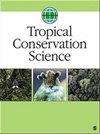养蜂在商业和环境上可行吗?对坦桑尼亚中部半干旱地区采用悬挂框架蜂箱的评估
IF 1.6
4区 环境科学与生态学
Q2 BIODIVERSITY CONSERVATION
引用次数: 0
摘要
在坦桑尼亚,养蜂有助于自然生态系统的发展和农村贫困人口的生计。这一活动为蜂产品提供了收入,并确保了粮食安全。本文探讨了悬挂框架蜂箱的采用及其对Dodoma地区Chemba地区的生计和森林保护的影响。数据收集通过访谈和焦点小组讨论使用结构化和非结构化问卷。通过统计软件包SPSS version 16和内容分析对定量和定性信息进行分析。研究显示,37.9%的养蜂人使用吊架蜂箱每年平均收入超过5万台币(21.57美元),36%的其他养蜂人使用木桩蜂箱每年收入低于5万台币(21.57美元)。养蜂的平均收入表明,社区尚未获得合理的收入,以强调养蜂活动是主要的收入来源。此外,传统的养蜂仍然是首选的技术,因此危及该地区周围的森林生态系统。这意味着采用悬架蜂箱仍然是为了保证森林的保护。该研究建议,政府应与私人利益相关者合作,计划通过引进农村社区负担得起的改良蜂箱来改善养蜂业,并确保森林保护。本文章由计算机程序翻译,如有差异,请以英文原文为准。
Is Beekeeping Commercially and Environmentally viable? an assessment of the adoption of hanging frame beehives in semi-Arid Area of central Tanzania
In Tanzania, beekeeping contributes to the natural ecosystem growth and livelihood of rural poor people. This activity provides income and ensures food security as generated from bee products. This paper explores adoption of hanging frame beehives and its implications for livelihoods and forest conservation in the Chemba district, Dodoma region. Data was collected through interviews and Focus group discussions using structured and unstructured questionnaires. Quantitative and qualitative information were analysed through a statistical package SPSS version 16 and content analysis. The research revealed that 37.9% of the beekeepers obtain an average income of above 50,000 (21.57 USD) Tshs per year from using hanging frame beehives and 36% of other beekeepers obtain less than 50,000 (21.57 USD) Tshs per year from using log beehives. The average income from beekeeping indicates that the communities are not yet receiving reasonable income to emphasise the activity as a main source of income. Furthermore, traditional beekeeping has remained a preferred technique, thus jeopardising the forest ecosystems around the areas. Implying that adoption of hanging frame beehives is still to ensure forest conservation. The study recommends that the government, in collaboration with private stakeholders, should plan to improve beekeeping by introducing improved beehives that can be affordable to rural communities and ensure forest conservation.
求助全文
通过发布文献求助,成功后即可免费获取论文全文。
去求助
来源期刊

Tropical Conservation Science
BIODIVERSITY CONSERVATION-
CiteScore
3.60
自引率
5.90%
发文量
16
审稿时长
>12 weeks
期刊介绍:
Tropical Conservation Science is a peer-reviewed, open access journal that publishes original research papers and state-of-the-art reviews of broad interest to the field of conservation of tropical forests and of other tropical ecosystems.
 求助内容:
求助内容: 应助结果提醒方式:
应助结果提醒方式:


